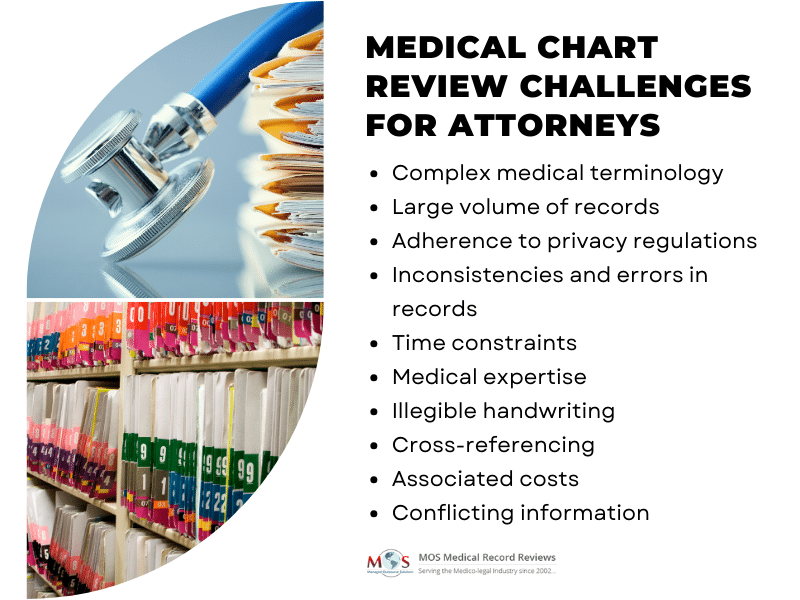Attorneys require medical record analysis, when handling cases related to medical malpractice, personal injury, workers’ compensation, or other areas of law where a person’s medical history and treatment are relevant. Medical chart review for attorneys refers to the process of examining and analyzing a patient’s medical records and healthcare-related documents as part of legal proceedings.
The primary objectives of medical chart review for attorneys include:
- collecting relevant evidence that can support their client’s legal claims or defenses
- assessing whether healthcare providers adhered to the accepted standard of care when treating the patient
- establishing a causal link between a healthcare provider’s actions or negligence and the patient’s injuries or damages
- determining the extent of a patient’s injuries and the associated damages to calculate potential compensation or damages sought in a legal case
- consulting with medical experts or hiring expert witnesses to assist in interpreting complex medical information
- supporting arguments during negotiations, settlement discussions, or court trials
Hurdles in Medical Chart Analysis for Legal Cases
- Complex medical terminology: Medical records contain complex terminology and abbreviations that can be challenging for attorneys without a medical background to understand. This can lead to misinterpretations or missed critical information.
- Volume of records: Medical records can be extensive, especially for complex cases. Sorting through a large volume of documents can be time-consuming and overwhelming.
- Privacy regulations: Medical records are subject to strict privacy regulations, such as the Health Insurance Portability and Accountability Act (HIPAA) in the United States. Attorneys must ensure they comply with these regulations to protect patient privacy.
- Inconsistencies and errors: Medical records may contain inconsistencies, errors, and omissions. It’s essential to identify these issues and determine their impact on the case.
- Time constraints: Attorneys often have limited time to review medical records, especially when working on tight deadlines. This can make it challenging to conduct a thorough review.
- Medical expertise: Interpreting medical records requires a solid understanding of medical procedures, diagnoses, and treatment protocols. Attorneys may need to consult with medical experts to ensure they accurately assess the records.
- Legibility: Illegible handwriting or poor documentation practices by healthcare providers can make it difficult to decipher information in the medical records.
- Redactions: Some information in the medical records may need to be redacted to protect patient privacy. Identifying what can and cannot be shared in court is crucial.
- Cross-referencing: Attorneys may need to cross-reference medical records with other pieces of evidence, such as witness testimonies or expert opinions, to build a strong case.
- Changing regulations: Healthcare regulations and standards can change over time. Attorneys must stay up-to-date with these changes to ensure they are considering the most current standards of care.
- Cost: Medical record retrieval and review can be expensive, as attorneys may have to pay for copies of records or hire medical experts to assist with the review.
- Conflicting information: Different healthcare providers may have varying perspectives or interpretations of a patient’s condition and treatment. Attorneys must navigate conflicting information and present a cohesive argument.
To overcome these challenges, attorneys often collaborate with medical experts, nurses, and paralegals who have experience in medical chart review. They may also use specialized software or technology to streamline the process and ensure accurate and efficient review of medical records.
What’s especially valuable in outsourcing medical record reviews to external agencies is their wealth of experience in scrutinizing large-volume medical documentation. A professional medical review team will present concise, easily digestible records organized chronologically, enhancing the efficiency of the attorney’s review process.





